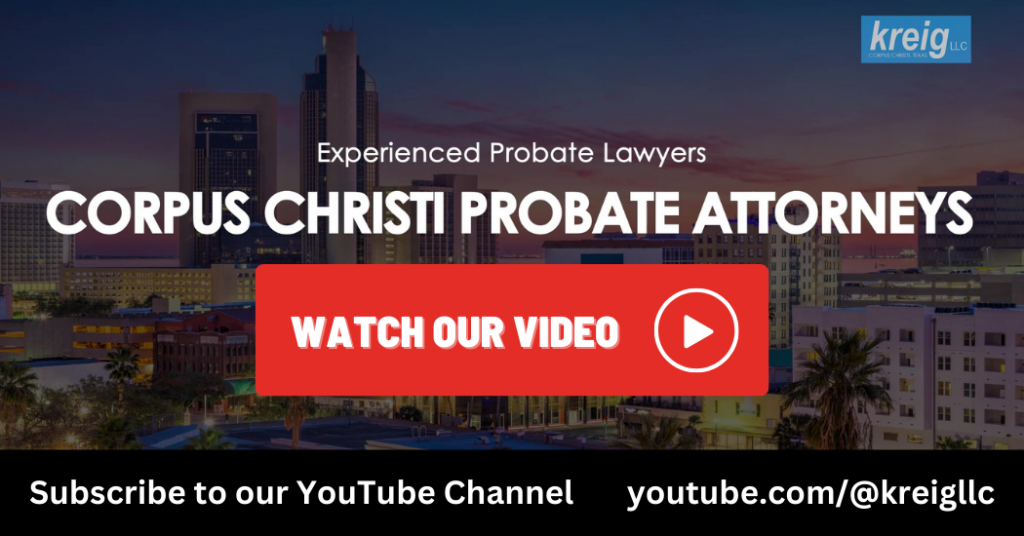Even with the simplified probate process in Texas, probate can still be a long, complicated process for some that can be enormously frustrating for loved ones who are trying to manage a deceased person’s estate. While avoiding probate may be the best option in some cases, it’s important to weigh the pros and cons before making a decision. In this article, we’ll explore some of the benefits and drawbacks of probate so that you can make an informed decision about what’s best for you and your family.
What Is The Probate Process? A Definition
One of the biggest concerns people have when it comes to estate planning is how the process will affect them and their loved ones. Probate can be an incredibly complicated and drawn-out process, but there are a few things you should know about it to help make a decision about whether or not avoiding it is the right thing for you.
The probate process begins with a death certificate. This document officially documents that someone has died and is now eligible for probate. After the death certificate is filed, the next step is to appoint an executor. The executor is responsible for taking care of all of the deceased person’s financial affairs, including any real estate or vehicles that may be owned.
Once an executor is appointed, they will start gathering information about the deceased person’s estate. This includes records of any assets that have been transferred or inherited and bills or other debts that may have been incurred during their lifetime. The executor will also contact family members and other important individuals to get information about the deceased person’s life and finances.
Once all of this information has been gathered, the executor will begin preparing a probate petition. This document lays out all of the evidence that proves that property in the decedent’s estate is worth examining and should be distributed according to their will. The petition must be filed with the court in the county where the decedent lived at the time of their death.
Probate can take a long time to complete, and it can be a challenging process for family members who are dealing with sudden bereavement. However, avoiding probate can have serious consequences, including lost inheritance money and additional taxes that may need to be paid. If you are unsure about whether or not probate is the right process for your situation, speak with an experienced estate planning attorney.
How Can You Avoid The Probate Process?
Probate is a process by which an estate is transferred from the deceased person’s estate to the beneficiaries of that estate. Probate can be a costly and time-consuming process, and it’s often recommended that estates avoid it whenever possible. However, there are certain circumstances in which probate is necessary, and it can be a good idea to consult with an attorney about your specific situation. Here are six reasons why avoiding probate may not be the best idea:
1. Probate can delay distributions to beneficiaries. When an estate is administered through probate, it can take longer for assets to be distributed to beneficiaries than if the estate is not probated. This can lead to delays in receiving rightful proceeds from assets, and can also increase costs associated with the probate process.
2. Probate can increase costs. The cost of probating an estate can vary based on the size of the estate and the jurisdiction in which it is filed, but it is usually quite expensive. This expense could be lost income if distributions are delayed or if the estate has to be re-probated as a result of amendments made during the administration of the estate.
3. Probate can create legal conflicts. When an estate is administered through probate, it may be subject to different legal rules than when the estate is not probated. This can lead to conflicts between the beneficiaries and the person who is administering the estate, which can result in additional expenses and delays.
4. Probate can delay distributions to beneficiaries. When an estate is administered through probate, it may take longer for assets to be distributed to beneficiaries than if the estate is not probated. This can lead to delays in receiving rightful proceeds from assets, and can also increase costs associated with the probate process.
5. Probate can create personal financial risks. While probate proceedings are usually governed by strict procedural rules, these rules can sometimes be interpreted in ways that expose beneficiaries to personal financial risks. For example, if a beneficiary contests a will or other document that establishes their entitlement to property, they may be unsuccessful and end up owing money to the estate or its creditors.
6. Probate can delay estates from being passed on to future generations. When an estate is not probated, it becomes part of the deceased person’s permanent record. This record can be accessed by anyone who wants to know about the deceased person’s finances and property holdings, which can be problematic if the estate is large and complex. If an estate is probated, however, it becomes part of the public record and is less likely to be accessible to unauthorized individuals.
Joint Tenancy:
Joint tenancy is a type of tenancy where two or more people own the property together. Joint tenants have the same rights and responsibilities as if they were single owners. This means that if one joint tenant dies, the other joint tenants are responsible for paying the deceased’s debts and funeral expenses.
Joint tenancy can be a good option for people who want to avoid probate, since it doesn’t require a court approval. However, joint tenancy is not always safe, since it can be vulnerable to legal disputes. If one joint tenant decides to sell or rent the property without the consent of the other joint tenants, they may face legal consequences.
If you’re considering using joint tenancy, make sure you understand your rights and responsibilities before signing any paperwork.
Life Insurance Policies:
Probate can be a complicated legal process that can take many months or even years to complete. During this time, the estate may be subject to probate court proceedings, which could result in excessive costs and delays. Additionally, probate can lead to the distribution of assets to creditors, which may not be the most equitable solution for estates large or small.
Some people choose to avoid probate by transferring their assets into a trust prior to their death. This is a good option if the person creating the trust knows exactly what they want the trust to do with the assets after they die. If not, a trust can become bogged down with legal paperwork and can be difficult to manage.
Finally, life insurance policies provide an immediate financial safety net in case of death. If you have a life insurance policy, make sure you are aware of your rights and options if you experience a death in the family.
Trusts:
When it comes to estate planning, many people think of trusts as a way to avoid probate. But is that always the best decision? Here are four reasons why avoiding probate isn’t always the best idea:
1. Probate can be time-consuming and expensive. The process can take up to six months, and can cost between $2,000 and $5,000. In some cases, the cost of probate can be even greater.
2. Probate is not always accurate. If there is any dispute over who owns a property or how much money is owed, probate may not determine who owns the property or how much money is owed correctly. This could lead to confusion and potential litigation.
3. Probate can delay distribution of assets to beneficiaries. If there are joint owners of a property, for example, one of them may have to go through probate in order for the entire property to be distributed to the beneficiaries properly. This can create extra delays and complicate the process for everyone involved.
4. Probate can damage relationships with heirs. If you don’t want anyone to contact you about your estate after you die, avoiding probate may not be the best way to go about it. In most cases, your heirs will be required to file a petition with the court in order to access your estate. This can cause tension and conflict between you and your heirs.
If you are considering estate planning, trusts are an option that should be considered. They can help to avoid probate and make the distribution of assets more accurate and timely.
What Are The Pros And Cons Associated With Avoiding Probate?
Probate is often seen as a dreaded process, one that most people would rather avoid. But is it always the best option? In this blog post, we’ll explore the pros and cons of avoiding probate, and determine whether or not it’s the best course of action for you.
Conclusion
Avoiding probate may seem like a great option at first, but there are some important things to consider before taking that step. Probate is an expensive and time-consuming process, and it can result in serious complications if not handled correctly. If you have any questions about whether or not avoiding probate is the right decision for you, please don’t hesitate to reach out to a qualified legal professional.
Do You Need to Hire an Attorney for Probate?
If you’re the executor or administrator of someone’s estate, there’s a good chance you’ll need to go through probate. Probate is the process of settling an estate by granting legal rights and responsibilities to the beneficiaries. But before you even consider going through probate, you should ask yourself whether it’s really necessary.
There are a few reasons why avoiding probate might be a better idea.
First, probate can be expensive. Depending on the size and complexity of your estate, you may end up hiring an attorney to represent you in the proceedings.
Second, probate can take a lot of time. The average probate process can take around six months, which means that if you need to close the estate quickly, probate might not be the best option.
Finally, probate can sometimes result in disputes between beneficiaries. If there are disagreements about who gets what property or money, probate can put an obstacle in your way.
If you’re concerned about any of these issues, it might be worth considering other options before deciding to go through with probate. Talk to an experienced probate lawyer about your options. (361) 502-4240.

Related questions
What is probate court do with a will?
Probate court is a type of court that deals with the estate of a person who has died. The court will appoint an executor or administrator to handle the estate, and will oversee the distribution of the assets. Probate can be a time-consuming and expensive process, so many people try to avoid it. However, there are some situations where avoiding probate isn’t a good idea.
One reason to go through probate is to make sure that all of the deceased person’s debts are paid. If the estate doesn’t go through probate, creditors may still come after the heirs for payment. Another reason to go through probate is to ensure that the property is distributed according to the deceased person’s wishes. If there is no will, or if the will is invalid, the court will decide how to distribute the assets.
Probate can be a lengthy and complicated process, but in some cases it’s necessary in order to protect the interests of the deceased person’s heirs. If you’re not sure whether or not probate is right for your situation, it’s best to speak with an attorney who specializes in estate planning.
What does probate mean?
When a person dies, their estate must go through the probate process in order to be legally distributed to their heirs. Probate is the legal process of settling an estate, and it can be a time-consuming and expensive process. Many people try to avoid probate by using trusts or other methods, but avoiding probate isn’t always a good idea.
There are some advantages to going through probate, such as the fact that the process can help to ensure that all debts and taxes are paid. Additionally, probate can provide some protections for the heirs of an estate. For example, if there are any disputed claims against the estate, they will need to be resolved through the probate court before the estate can be distributed.
Ultimately, whether or not to avoid probate is a personal decision. Some people feel that the advantages of probate outweigh the disadvantages, while others prefer to avoid it if at all possible. There is no right or wrong answer, and each individual’s situation is different.
Define what is probate estate?
Probate is the legal process of distributing a person’s estate after they die. Probate estates are supervised by a court and can be very time-consuming and expensive.
Avoiding probate may seem like a good idea, but it’s not always the best choice. Here are some things to consider before making a decision.
1. The size of the estate: If the estate is small, probate may not be necessary.
2. The assets: Some assets, like life insurance policies and retirement accounts, don’t need to go through probate.
3. The beneficiaries: If all of the beneficiaries are in agreement, probate may not be necessary.
4. The timeline: Avoiding probate can take longer than going through the process.
5. The cost: Probate can be expensive, but avoiding it can also be costly.
How to transfer property (e.g., a house) to a beneficiary after death of parent without will?
There are a few ways to transfer property to a beneficiary after the death of a parent, but avoiding probate isn’t always the best option. Probate is a legal process that helps to ensure that a deceased person’s debts are paid and their assets are distributed according to their wishes. While it can be time-consuming and expensive, avoiding probate can often lead to more problems down the road.
If you’re not sure what your parent’s wishes were or if they didn’t have a will, transferring property through probate may be the best way to ensure that everything is handled correctly. An experienced probate attorney can help you navigate the process and make sure that all of the necessary paperwork is filed correctly. They can also help answer any questions you may have about the process.
Avoiding probate may seem like an attractive option, but it’s important to weigh all of your options before making a decision. In some cases, it may be the best choice, but in others it could lead to more problems than it solves.




